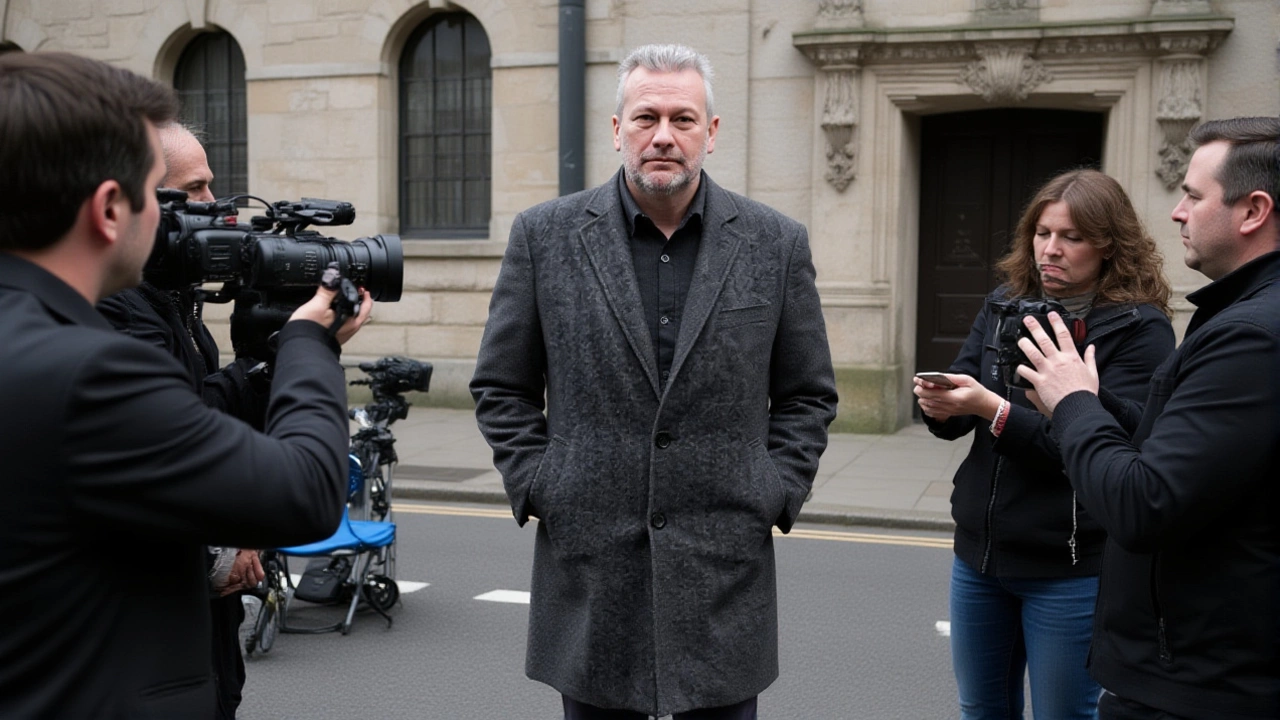When Nathan Gill boarded a flight to Moscow on September 13, 2021, he claimed he was attending a scientific conference. What police found in his phone told a far darker story: a trail of cash-for-loyalty messages, coded as "Christmas gifts," that exposed him as a traitor in plain sight. On November 21, 2025, at the Old Bailey, Gill — once the face of Reform UK in Wales and a former Member of the European Parliament — was sentenced to 10-and-a-half years in prison after pleading guilty to eight counts of bribery. He’d taken at least £40,000 from Oleg Voloshyn, a sanctioned pro-Russian Ukrainian official, to mouth Kremlin talking points on the EU floor. The twist? He didn’t just speak them. He delivered speeches written for him — word for word.
The Deal That Broke the EU
Between December 2018 and July 2019, Gill used his position as an MEP to promote Russian narratives while quietly pocketing cash. Investigators found WhatsApp exchanges where Gill wrote, "I’ve received all promised exmas gifts." Prosecutors confirmed: "exmas" meant cash bribes. Voloshyn, who’d held a government post in Ukraine before 2014 and was later sanctioned by the UK in 2022, wasn’t acting alone. Court documents suggest he was part of a broader Russian influence operation targeting Western democracies. Gill even offered to introduce other MEPs to Voloshyn — a chilling attempt to expand the network. Though no other lawmakers were proven to have taken bribes, the mere suggestion that he tried to recruit them raised alarms across Brussels and Westminster.How It Unraveled: The Airport Stop That Changed Everything
The case didn’t explode from a whistleblower or leaked document. It started with a routine security check at Manchester Airport. Gill, traveling under the guise of observing Russia’s September 2021 Duma elections, was stopped. His phone was seized. And there, in plain sight, were the messages — casual, unguarded, and damning. One message showed him thanking Voloshyn for "the usual" after a speech. Another asked whether "the next payment" would be "before Christmas." The prosecution called it a "business arrangement," with Gill as the vendor and Russia as the client. The judge, Mrs. Justice Cheema-Grubb, called it "a fundamental compromise of a supranational legislative body," especially dangerous given the EU’s 2017 association agreement with Ukraine — a deal Russia had actively undermined.Who Was Nathan Gill?
Gill’s fall from grace was steep. He first rose with UKIP in 2004, becoming leader of UKIP Wales by 2014. He was elected to the European Parliament in 2014, then switched to the Brexit Party — which later became Reform UK. He briefly sat in the Welsh National Assembly (Senedd) between 2016 and 2017. By 2021, he was leading Reform UK’s Welsh election campaign. But internal tensions grew. He was expelled from the party later that year — not for the bribes, but for erratic behavior and public outbursts. No one suspected treason. Not even Nigel Farage.
Reform UK’s Dilemma: Guilt by Association?
In a statement after the sentencing, Reform UK called Gill’s actions "reprehensible, treasonous and unforgivable." But the real question isn’t just about him. It’s about how someone like Gill, with a long history in Eurosceptic politics, could operate for over a year without scrutiny. Security minister Dan Jarvis didn’t mince words: "He used his privileged position to advance the malign interests of Russia over those of the UK." Meanwhile, Nigel Farage — who led Reform UK until 2020 — said he had "no knowledge" of Gill’s activities. Police confirmed he’s not under investigation. But that hasn’t quieted the calls. Prime Minister’s advisors and opposition leaders are demanding a full review of Reform UK’s ties to Russian-linked figures. Was Gill an outlier? Or was he a symptom of something deeper?The Russian Hand: A Wider Threat?
Counter-terrorism police believe some individuals in this case had "a direct link to Vladimir Putin." That’s not just a political accusation — it’s an operational assessment. The Metropolitan Police’s Counterterrorism Command has flagged Russian interference in British democracy as a "particular challenge." Gill’s case isn’t isolated. In 2023, a former Conservative Party donor was investigated for funneling money to Russian-aligned think tanks. In 2022, a Latvian businessman tied to Kremlin elites was caught trying to bribe a British MP through a London-based lobbying firm. Gill’s actions fit a pattern: exploit trust, use legitimate platforms, and corrupt from within. His betrayal wasn’t just financial. It was ideological. He didn’t just take money — he weaponized his voice.
What’s Next for British Democracy?
The sentencing closed one chapter, but opened another. The UK government now faces pressure to overhaul its parliamentary ethics oversight. MEPs no longer serve, but the structures that allowed Gill to operate — lax financial disclosures, minimal monitoring of foreign contacts — still exist in the House of Commons. Experts are calling for mandatory digital forensic checks for politicians traveling to hostile states. Others want real-time monitoring of communications between elected officials and sanctioned individuals. Meanwhile, Gill sits in a cell, his legacy reduced to a cautionary tale. He once spoke of "taking back control." Instead, he sold it.Frequently Asked Questions
How did Nathan Gill manage to accept bribes without being caught sooner?
Gill exploited gaps in parliamentary oversight. MEPs weren’t required to disclose private communications or foreign payments, and his bribes were delivered in cash through intermediaries. The WhatsApp messages were encrypted and disguised as casual chats. It wasn’t until his suspicious travel to Moscow triggered a security stop that investigators found the evidence. His position as a known Brexit figure also made him seem less threatening to internal watchdogs.
What role did Oleg Voloshyn play in Russian influence operations?
Voloshyn, a former Ukrainian official with ties to pro-Russian factions, was sanctioned by the UK in 2022 for supporting destabilization efforts. Evidence suggests he acted as a middleman between Russian intelligence-linked networks and Western politicians. He didn’t just pay Gill — he provided scripted speeches, coordinated timing with Russian media cycles, and used coded language to avoid detection. His network appears to have targeted multiple EU and UK figures, though Gill was the only one caught.
Why is this case considered a national security threat?
Gill didn’t just take money — he used his official platform to amplify Russian disinformation during a critical time: Russia’s ongoing aggression in Ukraine and its campaign to fracture Western alliances. By pushing pro-Kremlin narratives in the European Parliament, he undermined EU unity and lent legitimacy to Russian falsehoods. That’s not political dissent; it’s active sabotage. Counter-terrorism officials classify such actions as hybrid warfare — using individuals to erode democratic institutions from within.
Could this happen again in the UK Parliament?
Yes — unless reforms are made. MPs still aren’t required to report foreign travel or private communications with sanctioned individuals. Financial disclosures remain voluntary and outdated. The case exposed a dangerous blind spot: we monitor overt espionage, but not subtle corruption by insiders. Experts warn that without mandatory digital audits, ethical training, and real-time monitoring of foreign contacts, other politicians could be targeted using the same playbook.
What’s the connection between Nathan Gill and Nigel Farage?
There’s no evidence of direct involvement. Farage led Reform UK until 2020 and had no knowledge of Gill’s actions, according to police. But Gill was a prominent figure in the party during Farage’s leadership, and his rise mirrored the party’s anti-EU messaging. Critics argue this raises questions about whether the party’s culture enabled such behavior — not through direct orders, but by normalizing extreme anti-EU rhetoric that aligned with Russian interests. Farage has not been investigated.
What does this mean for Reform UK’s future?
Reform UK faces reputational damage, especially as it seeks to expand beyond its Brexit base. While the party has distanced itself from Gill, voters may question whether similar figures remain within its ranks. The party’s leadership now faces pressure to publish a full audit of past members’ foreign contacts and adopt stricter ethics rules. Without transparency, the association with Gill’s treason could linger — and deter moderate supporters.




